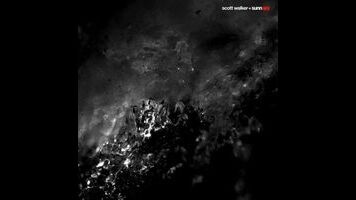Scott Walker and Sunn O)))’s Soused is as magnificent as it is menacing

When news dropped earlier this year that drone-metal kings Sunn O))) were working on an album with enigmatic singer-songwriter Scott Walker—former member of ’60s pop group The Walker Brothers, current avant-garde innovator—the mega collaboration should have been a foregone conclusion thanks in part to each artist’s allegiance to the supremacy of volume. (Walker had actually been approached by Sunn O))) prior to their making of Monoliths & Dimensions, but he declined due to another project.) Pairing the somber and overpowering baritone bravado of Walker—not to mention his mad-poet mystique—with the subterranean thunder and tumbling towers of holy-hell from the core duo of Stephen O’Malley and Greg Anderson seemed like the perfect marriage.
And it is. Soused is a joining of forces by two cryptic presences. Walker and Sunn O))) have spawned an ominous five-track behemoth that’s experimental in its instrumentation—because there will never be enough overdubs of bullwhip-cracking in this world—but structured in its songwriting approach, offering listeners something to hold on to if they can find handles on forever swelling and yowling drones. Considering that Bish Bosch exists, Walker’s incredible mindfuck of a full-length from 2012, the notion that he would ever find steady footing on Earth again seemed remote. It so happens, however, that Sunn O)))’s knack for drowning a track’s background in grim guitar sustain and negative noise provides the perfect stage for the theater in Walker’s vocals. For example, a chilling line like “A beating would do me a world of good,” delivered in a tone of absolute anguish, reaches even greater depths when set atop a smoldering, slow-diving buzz of distortion. Who knew?
Soused represents another distinct chapter in Walker’s long, meandering—and occasionally confounding—retreat to a realm of outsider composition that he alone occupies. Even when Walker was tending toward baroque pop during his late-’60s Scott solo efforts, his wild lyrical flourishes were always concerned with telling a story packed with dark metaphor and allegory rather than plating a radio-ready vocal hook—it was more like he was leading a high-stepping brass band through the decadent streets of a city on fire. And those tendencies have freakishly intensified over the decades (1995’s industrial-leaning Tilt signifying his absolute detachment from the mainstream). Now at the age of 71 and more than 50 years into his career, Walker has curated an image that’s more mythical than ever, only somewhat due to a reclusiveness that has transformed the margins into his home. But if two albums in four years is any indication, that singular voice has plenty left to tell.